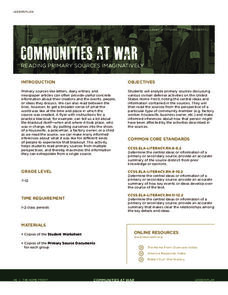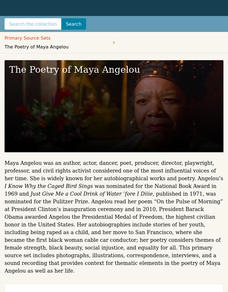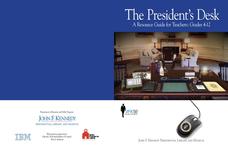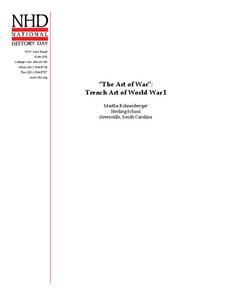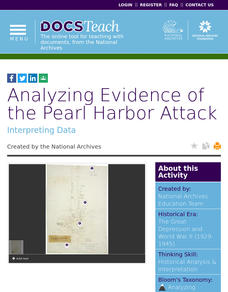National WWII Museum
Communities at War: Reading Primary Sources Imaginatively
Uncle Sam wants you to support the troops. Learners use an engaging lesson plan to analyze primary and secondary sources to discover what life was really like for American citizens at home during WWII. Pupils complete...
Roy Rosenzweig Center for History and New Media
Continental Differences
Students break into groups and closely investigate primary sources associated with the seven different continents. After deciding which continent their primary sources relate to, representatives from each group present their...
Digital Public Library of America
The Poetry of Maya Angelou
Maya Angelou's work reflects her passion for life, civil rights, and justice for all. A collection of 12 primary sources provide scholars with insight into this amazing woman. The set includes photographs, articles, recordings of...
Urbana School District
Knocking Down Fences
After reading The Other Side and guiding children through a picture walk, third graders investigate evidence of the civil rights movement. In the mini unit, 3rd graders analyze photographs of the past and make connections...
TCI
Ain't I a Woman?
Learners discover the impact of women on civil rights in United States history by analyzing primary source clues to identify influential female figures.
DocsTeach
Evaluating Perspectives on Westward Expansion
Although popular culture tells the story of the American West simplistically, its reality is far more complex. Native American tribes—while already on the land—didn't have the same interests, and conflicts between white settlers and...
DocsTeach
To What Extent was Reconstruction a Revolution? (Part 1)
Some scholars consider the Civil War and Reconstruction a second American Revolution. Class members weigh in after examining primary sources, including a Congressional resolution calling for the Fifteenth Amendment and the credentials of...
Smithsonian Institution
Native Resistance: Native Resistance Then and Now
Native Americans lost so much—and gained so little in return. Scholars explore Native Americans' resistance to the United States government. The lesson uses primary sources to explore the different forms of protest and gives a voice to...
DocsTeach
WWI Propaganda and Art
Uncle Sam wants you! During World War II, the US government and military created a propaganda campaign to gain public support. The activity uses primary documents such as photos to explain how and why the propaganda campaign was...
Council for Economic Education
Business in the Middle Ages: Working in a Guild
Long before modern labor unions, guilds worked to ensure that workers had a fair wage. But, in medieval Europe, they also cooperated with the government. Using a simulation and primary source analysis, young scholars become hatters in...
Center for History Education
Breaking the Great League of Peace and Power: The Six Iroquois Nations During and After the American Revolution
What happens when you can't remain neutral? An informative lesson explores the impact of the American Revolution on the Iroquois Nations. Scholars learn about the six Iroquois nations and their treaty with the newly formed American...
Friends of Fort McHenry
Citizens For and Against the War of 1812
Use this exceptional resource to examine the discourse and debate that occurred at the start of the War of 1812 with your class. Learners will first consider their own position on the war in a silent journal writing activity. Then after...
Staples Foundation For Learning
The President’s Desk
What stories can a desk paperweight and picture frame possibly tell us about the president of the United States? Pupils are transported to the desk of President John F. Kennedy through an engaging interactive site. The guide offers...
American Battlefield Trust
Antietam 360
It was the single bloodiest day in Civil War history. Now, class members have the opportunity to walk in the footsteps of soldiers who fought in the Battle of Antietam using an interactive website. Supplemental resources include...
DocsTeach
Patent Analysis: Alexander Graham Bell's Telephone
Believe it or not, the plugs and wires on Alexander Graham Bell's patent application for telegraph improvements has a direct connection to devices today. Young historians examine the fine details of the patent application. After they...
Humanities Texas
A President's Vision: Thomas Jefferson
Here you'll find a fantastic resource for analyzing several primary sources regarding Thomas Jefferson's presidency, from his election and home in Monticello to the Lewis and Clark expedition and the Louisiana Purchase.
Humanities Texas
A President's Vision: Franklin D. Roosevelt
This poster goes well beyond any traditional worksheet in allowing learners to analyze a variety of primary source documents related to the presidency of Franklin D. Roosevelt.
National History Day
“The Art of War”: Trench Art of World War I
Teach pupils how veterans used art to deal with PTSD and shell-shock from trench warfare during World War I. Scholars use graphic organizers, a cartoon analysis sheet, and their own inferences to analyze primary source art work by veterans.
Center for History Education
The Cuban Missile Crisis
Cold War tensions led to hostile actions. Scholars use primary sources to understand the Bay of Pigs and the Cuban Missile Crisis during President Kennedy's administration. The lesson provides primary sources and a graphic organizer to...
Smithsonian Institution
Racism and Removal: Japanese Incarceration During World War II
During World War II people saw how far the government's control would go, but it was at the expense of its citizens. The resource brings the conditions of Japanese American internment camps to light using primary documents. Scholars...
University of California
Tenochtitlán
Behold, the Great Aztec empire! Scholars use primary sources to understand the impact of the Aztec city Tenochtitlan. Academics complete a worksheet and participate in group discussion to understand how Tenochtitlan was a melting pot for...
National Woman's History Museum
The Path to Women’s Suffrage
The Path to Women's Suffrage unit focuses on how Western Expansion was instrumental in gaining women the right to vote through the Nineteenth Amendment. Young historians analyze maps, examine primary source documents, and create a...
DocsTeach
Prequel to Independence
It's about time! Young historians use primary sources to create a timeline of events leading to American Independence. The fast-paced activity is designed to be used at the end of a unit on the Revolutionary War or as an assessment tool....
DocsTeach
Analyzing Evidence of the Pearl Harbor Attack
Don some detective caps and delve into the past to explore the evidence left behind after the attack on Pearl Harbor. An interesting activity uses primary sources to explore how the United States Navy was caught off guard and how the...
Other popular searches
- Primary Source Documents
- Using Primary Sources
- Primary Source Analysis
- Wwi, Primary Sources
- Rosa Parks Primary Documents
- Gilded Age Primary Sources
- Working With Primary Sources
- Primary Resources Hsie
- Web Quests Primary Sources
- Ancient Rome Primary Sources
- 1920 1929 Primary Sources
- Primary Sources and Family
